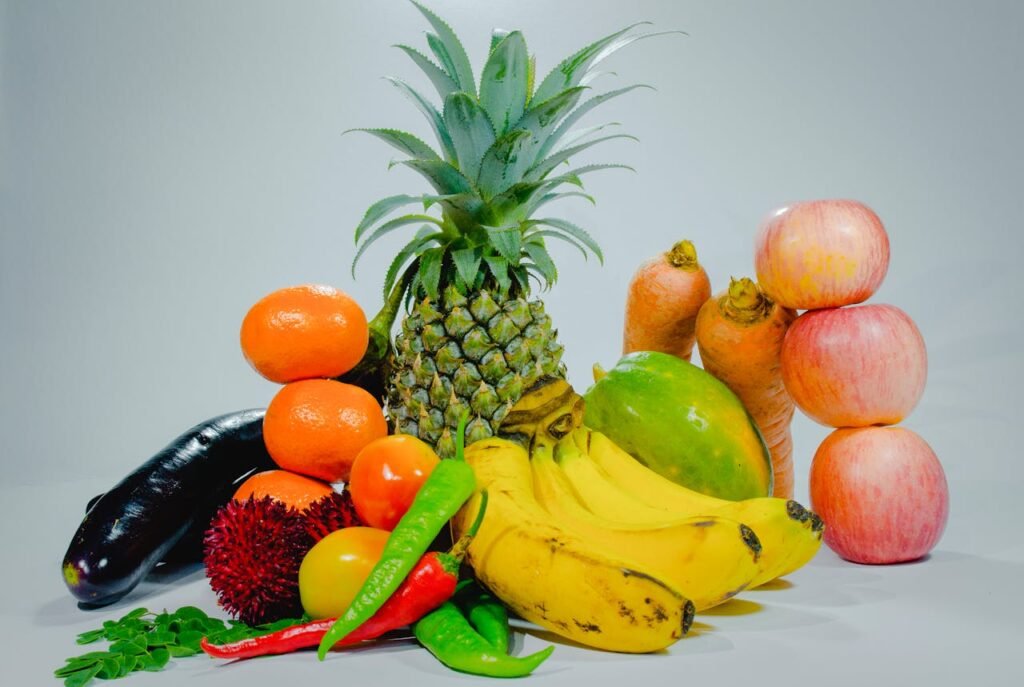SUSTAINABLE FOOD CHOICES
Bite-size change for a big impact
Eat well, Do Good
What we eat has a very significant effect on the environment, whether it is through greenhouse emissions, usage of water, or how the crops affect the soil. Sustainable food choices involve how one nourishes themselves while nurturing the environment.
Sustainable food choices in simple terms refer to the choices of food that will not only help an individual who makes these decisions but also conserve the environment. Principally, these are simply selections of food that create fewer environmental impacts such as those that are locally sourced, organic, and plant based. Locally sourced products mean less transport is required for them. Thus, fewer greenhouse gas emissions are generated. Organic foods are also grown free from those synthetic pesticides and fertilizers that tend to end up contaminating the source of water or local ecosystems. Plant-based food is likely to require fewer resources than animal-based food and, therefore, makes them a much more sustainable choice.
is one of the most essential steps we are taking in the fight against climate change. Indeed, the agriculture sector accounts for a significant share of greenhouse gas emissions, especially from the livestock, the emissions arising from the process of deforestation, and the use of synthetic fertilizers. Such green food products would provide a great opportunity for the public to decrease their carbon footprint. For example, in the research done on the production of vegetables, grains, and legumes, it has been shown that these emit less greenhouse gases compared to the production of meat and dairy products. Therefore, the increase in the amount of consumption of more plant foods will surely help someone become an eco-friendly citizen.
Sustainable food choices also come with healthy benefits. A diet consisting of organic products such as fruits, vegetables, whole grain, and legumes has been proven to have a low risk for diseases like heart diseases, diabetes, and cancers. Organic foods are generally known to be richer in nutrients and free of chemicals harmful to human health. However, if people put into practice the concept of sustainability, then they not only contribute to maintaining their health but also to maintaining the ecosystems and biodiversity stability.
The bigger picture of sustainable food choices goes beyond personal health and environmental footprint. Such methods benefit the local economies, ensuring food security by not depending on the international supply lines. Understanding and implementing the sustainable food choices, thus, are crucial steps towards the development of a resilient and environmentally conscious food system.
Let us learn about what are the steps we can take in our capacity to make a change.
1. If Possible, Embrace Plant-Based Food
- Try to reduce the meat consumption. Meat production has negative environmental impact. Consider adding vegetarian or vegan meals
- For protein and fiber, you can incorporate beans, lentils(dal), chickpeas(chole), kidney beans(rajma)etc.
- There are many plant-based meat alternatives in the market. You may try that.
- Whole grains like brown rice, whole wheat roti, bread, ragi, jowar etc. can be included in the diet.

2. Buy Local and Seasonal
- Try to buy fresh fruits and vegetables from the local vendors or from the farmers if possible. This may you would also be supporting them.
- Seasonal fruits and vegetables are typically fresher, tastier and affordable. They also require less energy for storage and transportation than out of season stock.
- Try to connect with local farms if possible, to get your fresh box of Seasonal delight.

3. Minimize Processed Foods
- The packaged foods available in the market are highly processed to make their shelf life high. You may try to avoid it.
- They may include sugars, unhealthy fats and artificial ingredients.
- Not only these affect your health, but processing and packaging of these foods create a bad impact on the environment too.

4. Reduce Food Waste
- Plan your meals and make a list of the groceries to buy avoid extra buying and leading to food spoilage.
- Store food properly in different ways for different kinds of food to extend their spoilage. You may want to look online or make a phone call to your mother and grandmother for the same they are an expert in these.
- Make some new dishes with the leftovers instead of throwing them away. Or you can distribute to the needy atleast they would get benefitted from these.

5. Look Into Food Packaging
- Whenever possible, opt for loose fruits and vegetables over pre-packaged ones
- Try to buy in bulk if you have space like grains, beans, nuts etc. to avoid packaging waste.
- Carry reusable bags like paper bag, cloth bag and utilize them instead of plastic bags.

Sustainable Cooking Practices
Adopting the eco-friendly cooking practice is one of the most significant steps to make the sustainable food choices. Energy-efficient cooking will reduce the amount of environmental impact and even help reduce utility costs. Using appliances such as pressure cookers and slow cookers will also contribute to effective and efficient use of appliances with less energy consumption as compared to traditional cooking methods. For instance, pressure cookers can cook almost any food much faster than traditional cooking methods, thus requiring fewer time units and energy. Similarly, cooking with lids on pots retains heat, allowing for lower settings on stovetops.
Water usage is another crucial element in working towards sustainability in the kitchen. Traditional ways of preparing food are usually quite wasteful with water. Consider steaming vegetables instead of boiling them because it needs less water and preserves the nutrients in food. Other techniques which you can incorporate include the batch-cooking of grains and legumes; apart from saving time and water, this also makes sure that less energy output is used for consumption. The way of preparing is very effective and perfect for meal prepping. Meal prepping is both easy and good for the environment.
The right cooking tools in a kitchen will determine if sustainable cooking will be promoted or not. It manages to minimize single-use plastics by using utensils and cookware materials that are good for the environment, such as stainless steel, cast iron, or bamboo. They are also designed to last for a long time and will serve in that capacity for many years before they become waste. Simple recipes using local, seasonal ingredients showcase how sustainable practices can be integrated into everyday cooking. For example, using seasonal vegetables for stir-fry highlights the benefits of sourcing food locally while still supporting local farmers and reducing the carbon footprint associated with transportation.
Building a Sustainable Food Community
Creating and building a sustainable food community is very important in promoting responsible, environmentally friendly practices and helping a shared commitment to healthy living. Such communities will provide people with a space where ideas can be freely shared and where people celebrate in making sustainable food choices for life. With such communities, when one joins a community or creates a community which focuses on sustainability, its members are able to increase their knowledge and contribute positively to their surrounding local environment.
A sustainable food community shares resources with members who can shop together on local produce, seeds, or organic gardening supplies. This would definitely save the cost and, at the same time, strengthen the bond of the group. Such collaborations can even help in the establishment of community gardens, where people can grow fruits and vegetables together, thus securing food more effectively and lessening dependency on industrial agriculture.
Sharing of recipes and cooking tips is also very essential. Community cooking events where citizens get a chance to try sustainable meals prepared from locally sourced, seasonal ingredients are quite essential. This is better for health and encourages the community to support local farmers. Protecting its environment while feeding a community’s people can be better done when communities celebrate various ways of cooking that benefit the earth.
People who feel the urge to help can look for local food programs, such as a local farmer’s market or a food co-op. Volunteer work for nongovernmental organizations related to sustainability or attending workshops on urban farming are great ways to understand sustainable practices better. Most communities hold parties or dinners at which food that is friendly to the environment is served. Such a party or dinner is a casual approach through which one meets people with similar concerns regarding sustainable food.
In conclusion, building a sustainable food community empowers people to live responsibly in terms of the environment while developing a friendship network. By working together, sharing experiences, and starting community projects, people can promote sustainable food choices. This helps to create a healthier and stronger community for everyone.






